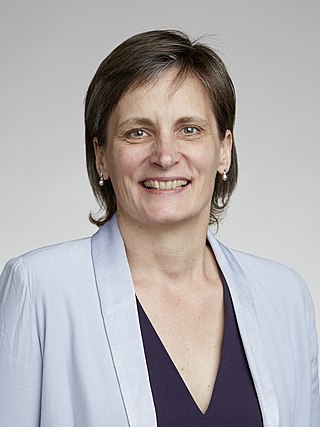
The Kyoto Protocol was an international treaty which extended the 1992 United Nations Framework Convention on Climate Change (UNFCCC) that commits state parties to reduce greenhouse gas emissions, based on the scientific consensus that (part one) global warming is occurring and (part two) that human-made CO2 emissions are driving it. The Kyoto Protocol was adopted in Kyoto, Japan, on 11 December 1997 and entered into force on 16 February 2005. There were 192 parties (Canada withdrew from the protocol, effective December 2012) to the Protocol in 2020.
Land use, land-use change, and forestry (LULUCF), also referred to as Forestry and other land use (FOLU), is defined as a "greenhouse gas inventory sector that covers emissions and removals of greenhouse gases resulting from direct human-induced land use such as settlements and commercial uses, land-use change, and forestry activities."
Greenhouse gas inventories are emission inventories of greenhouse gas emissions that are developed for a variety of reasons. Scientists use inventories of natural and anthropogenic (human-caused) emissions as tools when developing atmospheric models. Policy makers use inventories to develop strategies and policies for emissions reductions and to track the progress of those policies.
The Global Warming Solutions Act of 2006, or Assembly Bill (AB) 32, is a California State Law that fights global warming by establishing a comprehensive program to reduce greenhouse gas emissions from all sources throughout the state. AB32 was co-authored by then-Assemblymember Fran Pavley and then-Speaker of the California Assembly Fabian Nunez and signed into law by Governor Arnold Schwarzenegger on September 27, 2006.
The Climate Change Committee (CCC), originally named the Committee on Climate Change, is an independent non-departmental public body, formed under the Climate Change Act (2008) to advise the United Kingdom and devolved Governments and Parliaments on tackling and preparing for climate change. The Committee provides advice on setting carbon budgets, and reports regularly to the Parliaments and Assemblies on the progress made in reducing greenhouse gas emissions. Notably, in 2019 the CCC recommended the adoption of a target of net zero greenhouse gas emissions by the United Kingdom by 2050. On 27 June 2019 the British Parliament amended the Climate Change Act (2008) to include a commitment to net zero emissions by 2050. The CCC also advises and comments on the UK's progress on Climate change adaptation through updates to Parliament.

Carbon pricing is a method for nations to address climate change. The cost is applied to greenhouse gas emissions in order to encourage polluters to reduce the combustion of coal, oil and gas – the main driver of climate change. The method is widely agreed and considered to be efficient. Carbon pricing seeks to address the economic problem that emissions of CO2 and other greenhouse gases (GHG) are a negative externality – a detrimental product that is not charged for by any market.

The Global Carbon Project (GCP) is an organisation that seeks to quantify global greenhouse gas emissions and their causes. Established in 2001, its projects include global budgets for three dominant greenhouse gases—carbon dioxide, methane, and nitrous oxide —and complementary efforts in urban, regional, cumulative, and negative emissions.

The Carbon Pollution Reduction Scheme was a cap-and-trade emissions trading scheme for anthropogenic greenhouse gases proposed by the Rudd government, as part of its climate change policy, which had been due to commence in Australia in 2010. It marked a major change in the energy policy of Australia. The policy began to be formulated in April 2007, when the federal Labor Party was in Opposition and the six Labor-controlled states commissioned an independent review on energy policy, the Garnaut Climate Change Review, which published a number of reports. After Labor won the 2007 federal election and formed government, it published a Green Paper on climate change for discussion and comment. The Federal Treasury then modelled some of the financial and economic impacts of the proposed CPRS scheme.

Climate change is already affecting Japan, and the Japanese government is increasingly enacting policy to respond. However, its climate change policy has been described as "dirty" and the government criticised for lacking a credible plan to get to its pledged net zero greenhouse gas emissions by 2050. As a signatory of the Kyoto Protocol, and host of the 1997 conference which created it, Japan is under treaty obligations to reduce its carbon dioxide emissions and to take other steps related to curbing climate change.
Greenhouse gas emissions by Australia totalled 533 million tonnes CO2-equivalent based on greenhouse gas national inventory report data for 2019; representing per capita CO2e emissions of 21 tons, three times the global average. Coal was responsible for 30% of emissions. The national Greenhouse Gas Inventory estimates for the year to March 2021 were 494.2 million tonnes, which is 27.8 million tonnes, or 5.3%, lower than the previous year. It is 20.8% lower than in 2005. According to the government, the result reflects the decrease in transport emissions due to COVID-19 pandemic restrictions, reduced fugitive emissions, and reductions in emissions from electricity; however, there were increased greenhouse gas emissions from the land and agriculture sectors.

Climate change in Canada has had large impacts on the country's environment and landscapes. The number of climate change–related events, such as the 2021 British Columbia Floods and an increasing number of forest fires, has become an increasing concern over time. Canada's annual average temperature over land has warmed by 1.7 degrees Celsius since 1948. The rate of warming is even higher in Canada's north, the Prairies, and northern British Columbia. The country's precipitation has increased in recent years and extreme weather events have become more common.

Laurence Tubiana is a French economist, academic and diplomat. She served as France's Climate Change Ambassador and Special Representative for the 2015 COP21 Climate Change Conference in Paris, and is recognised as a key architect of the resulting Paris Agreement.

Marie Corinne Lyne Le Quéré is a French-Canadian scientist. She is Royal Society Research Professor of Climate Change Science at the University of East Anglia and former Director of Tyndall Centre for Climate Change Research. She is the chair of the French High Council on Climate and member of the UK Climate Change Committee. Her research focuses on the interactions between the carbon cycle and climate change.

A nationally determined contribution (NDC) or intended nationally determined contribution (INDC) is a non-binding national plan highlighting climate change mitigation, including climate-related targets for greenhouse gas emission reductions. These plans also include policies and measures governments aim to implement in response to climate change and as a contribution to achieve the global targets set out in the Paris Agreement.

Climate change in Germany is leading to long-term impacts on agriculture in Germany, more intense heatwaves and coldwaves, flash and coastal flooding, and reduced water availability. Debates over how to address these long-term challenges caused by climate change have also sparked changes in the energy sector and in mitigation strategies. Germany's energiewende has been a significant political issue in German politics that has made coalition talks difficult for Angela Merkel's CDU.

A carbon budget is "the maximum amount of cumulative net global anthropogenic carbon dioxide emissions that would result in limiting global warming to a given level with a given probability, taking into account the effect of other anthropogenic climate forcers". When expressed relative to the pre-industrial period it is referred to as the total carbon budget, and when expressed from a recent specified date it is referred to as the remaining carbon budget.

The Shift Project is a French nonprofit created in 2010 that aims to limit both climate change and the dependency of our economy on fossil fuels.

The Citizens Convention for Climate is a citizens' assembly held in 2019 and 2020 which discussed reducing France's carbon emissions by 40% from its 1990 levels in a spirit of social justice. It was initiated in response to the Yellow Vest protests to the fuel tax. The convention was modeled after a number of other deliberative experiments known as mini-publics. The members of the convention were 150 randomly selected citizens designed to be representative of the French public across six demographic dimensions: gender, age, socio-economic background, education level, location type, and province. The convention was assisted by a number of committees including the governance committee, a team of experts who provided organizational guidance and assistance, a guarantor college, which maintained the convention's independence, and a legal board. The members themselves divided into working groups on five issues within the topic of climate change: food, housing, employment, transportation, and consumption.

The environmental policy of the Joe Biden administration includes a series of laws, regulations, and programs introduced by United States President Joe Biden since he took office in January 2021. Many of the actions taken by the Biden administration reversed the policies of his predecessor, Donald Trump.
The Federal Act on the Reduction of CO2 Emissions (CO2 Act) (German: CO2-Gesetz, French: Loi sur le CO2, Italian: Legge sul CO2), is a Swiss federal law that regulates carbon dioxide emissions to mitigate climate change.













